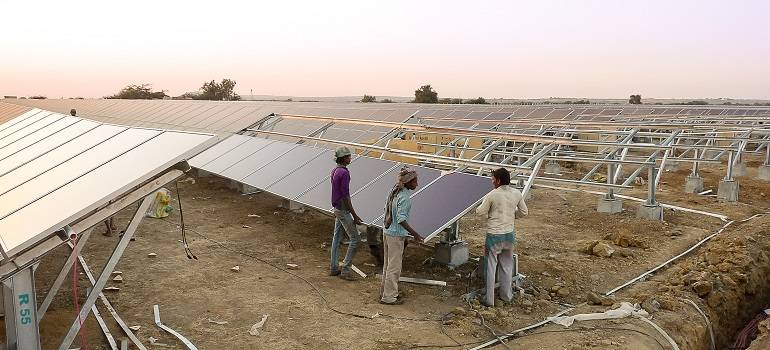 Solar power developers have expressed concerns that safeguard duty on solar equipment may jeopardize India’s target of installing 100 GW capacity by 2022 as it would directly affect 25 GW volume under various stages of implementation and hit thousands of jobs in the segment.
Solar power developers have expressed concerns that safeguard duty on solar equipment may jeopardize India’s target of installing 100 GW capacity by 2022 as it would directly affect 25 GW volume under various stages of implementation and hit thousands of jobs in the segment.
The Directorate General of Trade Remedies (DGTR), a recently created umbrella authority for trade matters, is scheduled to hold a public hearing in the national capital on Tuesday with regard to imposition of 70 per cent safeguard duty on imported solar equipment.
This has led to some confusion among the industry players since the standing committee on safeguards under the finance ministry had last month decided that no such duty was required to be imposed.
“Viability of more than 25,000 MW of projects along with thousands of jobs associated with construction of this capacity are on stake until there is a complete clarity and an outcome of safeguard duty investigation,” an industry source said.
“Currently, around 8 GW to 9 GW solar energy capacity is under construction at various stages and double of this capacity is also tendered out for allocation. Industry is completely blank on the treatment of these projects with ongoing investigation of safeguard duty,” the source added.
The industry is worried as the process of pass through (of the cost of duty on tariff) is very uncertain, long and complex and does not provide any assurances of protecting these projects from becoming NPAs (bad loans), if the duty is imposed.
Industry experts are of the view that availability of solar power at competitive rates (below Rs 3/unit) will not sustain long as the project cost expected to be increased by almost 40 per cent with existing recommendations of DG safeguard for imposing the duty on the import of solar modules.
Giving an instance about uncertainty of pass-through process, the industry sources said that not a single party is granted relief on solar tariffs on account of the Goods and Services Tax (GST) implications despite the provisions clearly laid out in contracts. Off-takers are opposing the impact on cost and legal process to continue for uncertain period.
Similarly, they said that no off-taker is going to bear this impact of duty under the pass-through mechanism and projects are likely to be failed if not protected through complete exemptions from safeguard duty if bids are submitted before the decision on safeguard.
In the recent past, discoms have reportedly even cancelled the bids for some technical reasons where actually the tariffs discovered were just above Rs 3 per unit through competitive bid process.
According to industry estimates with current average tariffs of Rs 2.75 per unit, these rates are likely to be hit by 35 to 40 per cent (increase to Rs 3.85/Kwh) if the duty is imposed. The high tariff of above Rs 3 per unit would not attract any discoms to come forward and sign power purchase agreements.
The industry source said, “The imposition of safeguard will be counter productive as any increase in the solar tariffs on account of trade measures will never be absorbed by state discoms, which are the ultimate producers of solar energy.
“Dependency of importing the raw material from China and lack of technological up-gradation would continue to keep India’s manufacturing uncompetitive compared to other Asian giants in the solar manufacturing.”
The industry body Solar Power Developers Association (SPDA) has also filed their concerns with all authorities, including the Ministry of New and Renewable Energy, DGTR, the Ministry of Commerce and even the Prime Minister’s Office, pleading to take a rational decision in the interest of National Solar Mission and India’s commitments in COP 21 for achieving 40 per cent renewable in energy mix by 2030.
“The new solar manufacturing policy formulated by Ministry of New and Renewable Energy have all the ingredients to surely drive the Indian solar manufacturers to reach the required scale and be technologically advanced to cater the local requirements and also be globally competitive for export as well,” the SPDA added.
Source: PTI


